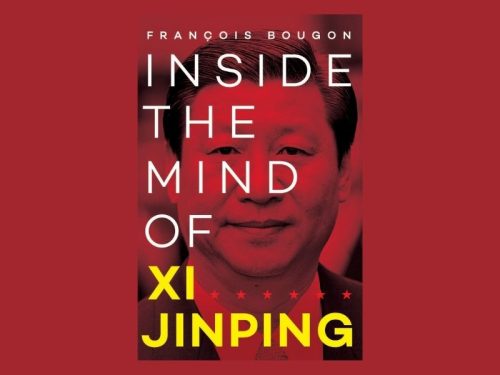China’s new Chairman Mao: Inside the Mind of Xi Jinping
Inside the Mind of Xi Jinping, Francois Bougon CONTEXT; Rs.599, Pages 181
Xi Jinping is now the all-powerful leader of China. A country of 1.4 billion people, it has some 90 million members of the Chinese Communist Party (CCP). It is the world’s second largest economy with a 2017 GDP estimated at US $12 trillion (Rs.857.33 lakh crore) representing nearly 20 percent of global income, which makes it larger than the next three — Japan, Germany and the UK — put together.
Xi Jinping assumed office as general secretary of the Communist Party in 2012. He has since acquired trappings of power comparable to Chairman Mao. The collective leadership model created by Deng Xiao Ping has, for all practical purposes, given way. With the constitutional bar on holding office beyond two terms having been lifted, Xi may be around for a long time as the supreme leader of China. Clearly, the world needs to know more about him.
Francois Bougon’s book does just that. An experienced China-hand and a correspondent with the French daily Le Monde, he uses Xi’s speeches and initiatives to piece together a portrait that provides telling insights into Xi’s thinking and leadership style.
Xi is a product of privilege (his father was a vice premier, post-1949) and privation (his father fell out of favour and Xi was sent out to the countryside during the Cultural Revolution). Instead of disillusionment with the Party, he emerged with renewed resolve to reach the top. After several initial rejection of applications to join the Party, he was finally accepted and worked his way up from local and provincial levels to national leadership. That experience has made him empathetic to rural and local-level poverty alleviation while instilling a winner-takes-all instinct for complete control over the CCP and state apparatus to realise his vision for China.
Xi has reiterated and reinforced his conviction in the supremacy of the Party and its sole monopoly over political power. However, the people’s acceptance of CCP’s monopoly of political power is conditional upon the party’s commitment to continuously improving their standards of living. In recognition of that, at the 19th CCP Congress, Xi framed this bargain as “the contradiction between unbalanced and inadequate development and the people’s ever-growing needs for a better life”. He noted that this was a “historic shift” and “creates many new demands for the work of the Party and the country”.
But the reality of contemporary China is that the poor are getting poorer and the rich are getting richer. A study by Peking University in 2016 showed that China has one of the world’s highest levels of income inequality, with the richest 1 percent of households owning 33 percent of the country’s wealth, and the poorest 25 percent households owning just 1 percent. Ironically, communist China has over 3 million dollar millionaires, and its nearly 600 dollar billionaires outnumber those in the US. Moreover the Party has become corrupt and sleazy materially and ideologically. Its cadres and leaders have become wealthy feeding off state and private enterprises. People’s faith in the Party’s purity has been shaken.
Against this backdrop, Xi’s anti-corruption drive is highly popular. In targeting not just the ‘flies’ but also the ‘big tigers’, many senior party, state and army functionaries have been felled. Conveniently, possible challengers and rebels have also been eliminated.
Bougon notes that Xi has melded China’s five millenia old civilization and traditions with its ‘socialist’ present. This contrasts with Mao’s exertions to denounce the past in the process of creating a revolutionary new China. A striking symbol is Confucius who is now reclaimed and promoted to signal historic continuity.
In the same vein, Xi has enunciated the lofty goal of the ‘Chinese Dream’. “To realise the great renewal of the Chinese nation is the greatest dream for the Chinese nation in modern history,” he says. It encompasses the two centenary goals: to build a moderately prosperous society in all respects by 2021 (when the CCP marks its centenary), and to build China into a modern socialist nation that is prosperous, strong, culturally advanced, and harmonious by 2049 (when the PRC celebrates its centenary).
The big picture that emerges may not be very comforting for the future of the liberal order in China. The West, notably the US, nurtured the hope that with prosperity, China would become more open and democratic; that its citizens would enjoy greater freedoms. That is a distant dream — Xi explicitly rejects western notions of democracy and a liberal order as unsuited to China’s conditions. The advocacy of political pluralism, dissidence, human rights, freedom of the press etc, is labelled as propaganda and conspiracy aimed at undermining China’s rise.
Bougon also quotes many notable sceptical individuals — Chinese and foreign — who fear for China’s future. Some voice certainty that the Communist Party’s rule is doomed. Others, like dissident writer Murong Xuecun, predict the rise of a “new market totalitarianism” adapted to the 21st century.
China has shown itself to be resilient. Xi’s handling of the current and emerging contradictions will determine how China copes. This book informs us of how Xi is going about his task.
TCA Rangachari (The Book Review, January)
Also read: China: Obedient autonomy
















Add comment